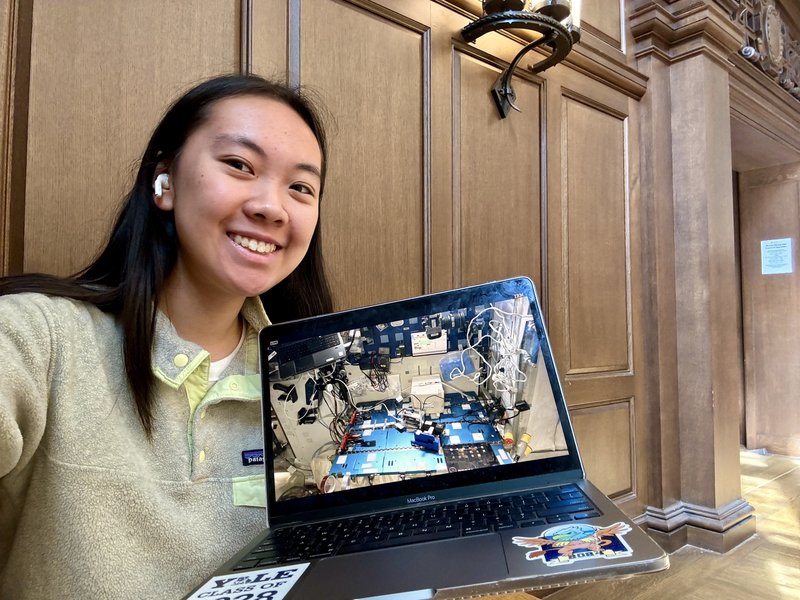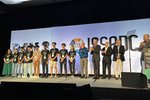Genes in Space student-designed experiment conducted by astronauts
Investigation aims to validate rapid detection of RNA risks during spaceflight

2023 Genes in Space Winner Isabel Jiang watching her experiment performed aboard the International Space Station
October 3rd, 2024 (KENNEDY SPACE CENTER, FL) - On Saturday, September 28th, an experiment designed by Genes in Space 2023 contest winner Isabel Jiang (18) of Hillsborough, California, launched to the International Space Station (ISS) aboard NASA's Crew-9 mission. The first run of her investigation was performed four days later by American astronaut Don Pettit, with a second run planned for later this month.
Jiang’s research project aims to validate a novel technique to study the effects of space conditions on retrotransposons—mobile genetic elements that can cut and paste themselves throughout our genome. LINE-1 copies comprise nearly 17% of the human genome, but under normal Earth conditions their mobility is suppressed by the body’s internal mechanisms. When activated, retrotransposons can lead to cancers and neurodegenerative diseases. Jiang hypothesized that LINE-1 suppression mechanisms may become dysregulated in space due to radiation or oxidative stress, posing a genetic risk for astronauts.
Because LINE-1 mobilization relies on a mediator ribonucleic acid (RNA) molecule, Jiang sought to develop a method to detect LINE-1 RNA, a harbinger of the retrotransposon jumping across the genome. To this end, a technique called nucleic acid sequence-based amplification (NASBA) coupled with a fluorescent molecular beacon serves to quickly detect LINE-1 RNA and immediately visualize the result. This is enabled on the ISS by two previously validated tools – the Genes in Space Fluorescence Viewer, a compact and easy-to-operate tool that allows for visualization of biomolecules, and the miniPCR thermal cycler, which will serve as a catalyst for the NASBA reaction. Validation of this technique would open the door to rapid diagnostic methods that can identify RNA-based genetic risks aboard the ISS.
Jiang was able to watch astronaut Don Pettit perform her experiment via livestream between her classes at Yale University, where she attends as a freshman studying Molecular, Cellular, and Developmental Biology.
"It was surreal to just see Don Pettit in space, and watching him do my own experiment we spent so long designing was so cool," said Jiang, "I also loved seeing the miniPCR equipment on the space station, especially because I had seen that same equipment in labs here on Earth! I’m so grateful for this opportunity and excited about my research."
Jiang won the 2023 Genes in Space competition after presenting her research to competition judges at the ISS Research & Development Conference last year in Seattle, WA. She was supported by her mentor, postdoctoral fellow at the University of Chicago, Dr. Aleksander Radakovic, who provided critical research and development on the investigation. Implementation was further supported by scientists Dr. Ally Huang at miniPCR bio, and Dr. Burcu Minsky at New England Biolabs, among others.
In studying how mobile DNA elements respond to space conditions, the team hopes to better understand the genetic risks to astronauts during long-term space travel. Jiang’s experiment builds on advances made by previous high school students through the Genes in Space contest, including the first DNA amplification in space and student-led gene detection investigations. Genes in Space was co-founded in 2015 by miniPCR bio and Boeing, with additional support from the ISS National Laboratory® and New England Biolabs.
Media contact: Marc Bliss, genesinspace@minipcr.com, 781-990-8727
About Genes in Space
Genes in Space™ is a national STEM contest that challenges students in grades 7 through 12 to design biotechnology experiments for space. Winning experiments are performed by leveraging the International Space Station (ISS) National Laboratory®, a platform for cutting-edge research and technology development that enables future space exploration. Genes in Space™ accepts applications between January and April each year. The contest is a collaboration between miniPCR bio™ and Boeing, with generous support from the ISS National Lab and New England Biolabs®. To learn more visit genesinspace.org


